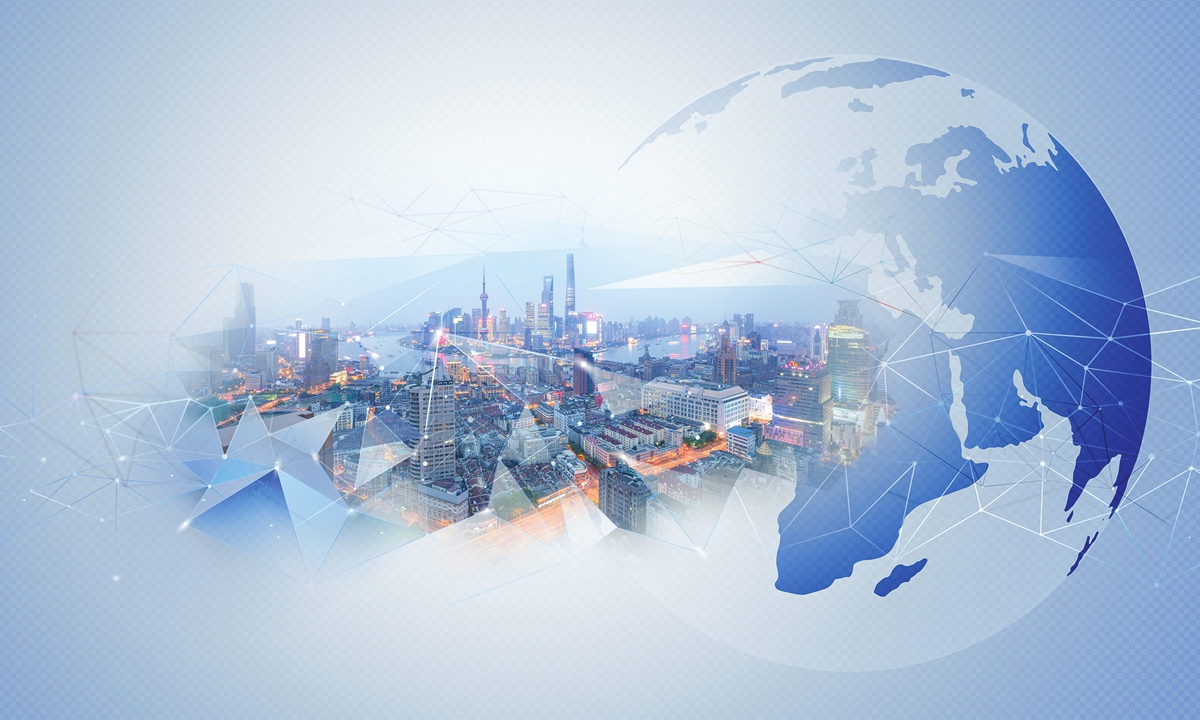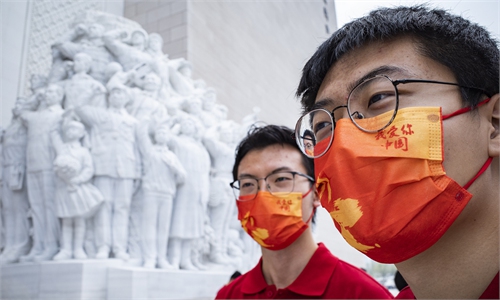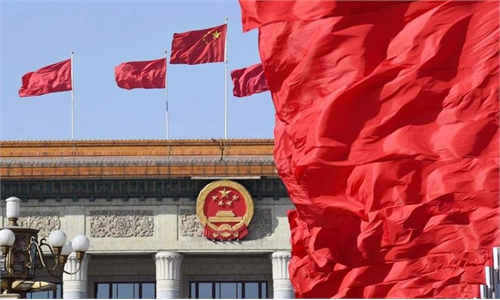
Photo:VCG
Editor's Note:For the Chinese people, the past decade has been epic and inspirational. The country, under the leadership of the CPC Central Committee with Comrade Xi Jinping at the core, has made great endeavors in boosting its economy, deepening reforms, improving the rights of its people and acting as a responsible power globally.
The world has been increasingly turbulent in recent years due to multiple crises triggered by the US-led West, while there is an obvious tendency that the West is more and more difficult to maintain its development momentum like in the last century. After the 2008 financial crisis, economic growth in Western countries has remained low, in stark contrast to China's boom. Global Times (GT) reporter Yan Yuzhu talked to Radhika Desai (Desai), convenor of International Manifesto Group and professor of political studies at the University of Manitoba in Canada, about her opinion toward the weakness of capitalism, the adverse consequences of neoliberalism for Western development, as well as China's role in making a way to pluripolarity.
This is the 25th of the series about this special decade.
GT: After the 2008 financial crisis, especially in the last decade, economic growth in the West has remained very low and the crisis of their domestic political system has been highlighted time and again. In contrast, China has maintained a relatively stable momentum of development, and the gap between China and the US has gradually narrowed. What do you think are the reasons for this difference?
Desai: The low economic growth of major capitalist countries since 2008 is the result of the turn to neoliberalism. It never managed to restore the growth of the 1970s. It occurred because production had outstripped demand and, rather than solving the demand problem, neoliberalism only made it worse. Its attack on organized labor and social spending restricted consumption demand while its encouragement towards financial and rentier activity reduced investment demand, siphoning away funds into speculation and predatory activity. The attempt to compensate for low demand, low growth and low government revenues by extending credit to consumers and governments has only led to mountains of debt and asset bubbles that have regularly burst, weakening economies further.
This process has been ongoing for more than four decades. At the start, the major capitalist countries were much healthier thanks to their "golden age" of robust growth and the broad-based distribution of incomes. But over time, the disastrous effects of neoliberal policies were assailing ever weaker economies.
In the aftermath of the 2008 financial crisis, a lot of people thought that neoliberalism would be abandoned, but it wasn't. The reason is simple: neoliberalism, which is really not about free markets or competition but about giving ever greater freedoms to big corporate capital, is the only way to keep these economies capitalist.
But doing so at a time when capitalism can no longer generate growth, and can only make societies more and more unequal can only lead to economic and political malaise. In essence, people in these countries are paying the price of keeping their economies capitalist. They can choose capitalism, or they can choose growth. They cannot have both. Capitalism is no longer capable of delivering growth.

Radhika Desai Photo: Courtesy of Desai
GT: Western political parties are constantly fighting internally without solving real problems, leading the approval ratings of many ruling parties to be at a record low. What do you think are the advantages of people's democracy in China? Can electoral politics solve social problems?Desai: Liberal democracy is a contradiction in terms. Keeping societies liberal and capitalist is incompatible with making them truly democratic. Capitalism is not in the interests of the vast majority of working people. Major capitalist states were not democratic in any real sense until after the World War II. The "socialistic" reforms of the "golden age" meant that the contradiction between liberalism and democracy was subdued as ordinary people got some welfarist concessions.
Neoliberalism since about 1980 has rolled back most of these concessions and contradictions have sharpened. To keep winning elections, ruling elites must now resort to more and more propaganda, secrecy and outright lies. This requires money and electoral politics in these societies, particularly in the US, has come to revolve around money and the media.
However, money and media can only do so much and, over time, politics and democracy are being hollowed out. Voters are disengaged. Politicians become "independent" of the popular will and rely on "experts," essentially people whose opinions are conveniently neoliberal. Such mutual alienation between people and the politicians opens the door to the senseless Brexit vote and the shocking election of Donald Trump.
Today, this process has reached such a point that the UK government can announce a budget in which the rich enjoy tax cuts, while the poor suffer the resulting economic crisis, unemployment and inflation. Similarly, European politicians put their populations last and commit economic suicide only to obey the unreasonable demands of the US. In this context, there is no question of democracy. It has become a joke.
China, by contrast, adheres to a more rounded concept of "whole process democracy" in which elections are only one part of a larger process which includes a commitment to providing people with economic security and progress.
GT: The Manifesto refers to today's capitalist world as a "political tinderbox," where capitalism's suitability is questioned as never before, political establishments are losing their grip and the credibility of the mainstream media is threadbare. How do you think the West has gradually fallen to this point? How will pluripolarity efforts reduce the likelihood of future conflicts in the world? What role does China play in this regard?
Desai: As I have already explained, in major capitalist democracies, politics is no longer about articulating and addressing popular needs and desires, but about keeping the lid on them so that governments can carry on the business of serving corporate and financial interests. Inevitably the political establishment is widely held with suspicion and even hated. Meanwhile, with the left on the defensive for decades, in confusion and disarray, far right and fascist forces are on the ascendant. This is what makes them political tinderboxes.
Right wing and fascist forces are tolerated by the political establishment: Bernie Sanders had to be stopped, while Trump could hold the highest office. Western countries support a regime in Kiev that relies on neo-Nazi forces and has banned the left wing opposition. This has required the wholesale distortion of Europe's history, and that can only make the advance of the right and fascism easier.
The weakness of the left today is a profound irony. The neoliberal era, with its attack on working class people, with its built-in misogyny and racism, should have been a prime opportunity to mobilize the masses against it. Instead, the traditional parties of the left have capitulated to neoliberalism and US imperialism.
This has left the working masses in the major capitalist countries without serious representation. Only small numbers of left groups and intellectuals truly appreciate the need to marry progressive domestic politics with anti-imperialism and express solidarity for socialist countries.
As for the media, the first alternative news websites began appearing in the late 1990s. Already then it was clear that the "mainstream media" could not be trusted and such outlets have proliferated since with the rise of the internet. Corporate ownership of the mainstream media ensures adherence to neoliberalism, but it also makes serious investigative journalism impossible by thinning staffing levels.
This left wing weakness in the imperialist countries relates directly to pluripolarity. As our manifesto says, humankind will journey to socialism through pluripolarity as different countries will embark on the long road from capitalism and imperialism to socialism in their own time and in their own manner. However, given the sorry state of the left in the imperialist countries, rather than both socialist class forces and socialist nations walking hand in hand towards socialism, as ideally they should, the role of socialist nations in showing the way has become more prominent, particularly that of China.
China's leadership in this process will also involve supporting measures to turn the institutions of international governance, including the United Nations, back to their original purpose. As you know, in recent decades, Western imperialism has tended to distort and corrupt them. Returning them to their original purposes, which included the right of nations to exercise true sovereignty by freely choosing the path and pattern of their development, including socialist forms, is critically important.
The resulting pluripolarity can only advance the cause of socialism and expand the range of efforts and experimentation that advance the cause of socialism.
GT: You once mentioned in a webinar that the West's willingness to engage with China in the 1990s and early 2000s is based on two illusions: one, the expectation that the CPC would simply be transformed into some sort of social democratic party at best or even a neoliberal party; two, the belief that China would remain a low-cost producer of low-tech goods. In your opinion, why does the West show such fear and anger after the disillusionment? How do you see the relationship between China's rapid development and its adherence to socialism with Chinese characteristics?
Desai: China's development is entirely attributed to the country's adherence to socialism, both in the early period under Mao and in the later reform and opening-up period.
China's socialism was an affront to US capitalism but, perhaps even more importantly, China's development was an affront to US imperialism because US capitalism requires the subordination of the rest of the world. After refusing to recognize the People's Republic of China for decades, engaging in the ridiculous charade that the government of tiny Taiwan island was the true government of the whole of China, even giving it China's seat in the UN and the UN Security Council. When US power sank to a postwar nadir in the early 1970s, with defeat impending in Vietnam, the then dollar in deep trouble and the Third World up in arms, Nixon came to China. His purpose was also to drive the wedge between the Soviet Union and the People's Republic of China deeper.
After reform and opening-up, the US stepped up economic engagement with China and the idea, particularly after the end of the Soviet Union in 1991 was that such engagement would also make China more or less capitalist, even neoliberal. However, for China this engagement was only another means to advance socialism. This became clear particularly after 2008. Rather like when, during the Great Depression of the 1930s, people the world over could see that while the capitalist countries were mired in a Great Depression, with mounting economic misery, the Soviet Union was going from strength to strength and had become the second industrial power, in the 2000s, particularly in the 2010s, it became clear that China's economic success was going from strength to strength while the major capitalist countries were languishing in a mire of low growth, rising inequality, increasing financialization, deteriorating public services, and rising political dissatisfaction. The difference could only be attributed to China's socialist system.
The US policy of engagement was really one of attempted subordination. However, China's leaders refused to permit this, engaging with the US and the rest of the world, in the process engineering the greatest industrial revolution ever witnessed. The CPC leadership also put China on the path to technological superiority in many fields, demonstrating clearly that Chinas' successes are due to the efforts of Chinese firms and institutions and to any "technology theft" as US leaders are fond of saying.
As the failure of the US to subordinate China became more and more obvious, it led to Obama's Pivot to Asia and the mounting US hostility to China that has followed since. After many years of rising military tensions, trade and technology wars and diplomatic tensions, President Biden is today taking this hostility to new heights, fomenting a fourth Taiwan Straits Crisis that is needless and dangerous. Many even in the US are saying this, despite the consensus, uniting both Democrats and Republicans, both "realists" and "liberal internationalists," that China is the main "threat" the US faces. This tendency to see the relations with China as a zero-sum game is the chief sign of US decline and its desperation.
The simple fact is that capitalism under US leadership is losing its hold over the world. The world can see that there are more attractive ways of organizing economies. Capitalism's senility and socialism's vigor are increasingly apparent.
GT: In the COVID-19 pandemic, China and many other socialist countries had a much lower mortality rate from coronavirus than did the neoliberal Western countries such as the US and the UK. How do you understand China's life-saving epidemic prevention strategy, as well as the public health system built on it?
Desai: The contrast between the West's failures in the face of COVID and China's success is staggering. From the start, I argued that the West's failures - on public health and on the economic, social, political and cultural fronts - during the pandemic have been entirely due to neoliberalism. Western countries, particularly the two leading neoliberal countries, the US and the UK, have clocked up the worst COVID death rates among all their peer countries. Their public authorities were willing, from the start, to sacrifice lives on the altar of capital, above all, financial and corporate capital. The profound irony is that in pursuing this goal, they ended up with an even worse capitalist induced crisis, as well as the worst death rates among peer nations.
Leading neoliberal financialized nations initially considered the murderous strategy of letting the pandemic rip through the population until "herd immunity" was reached (by infection, not vaccination). Public outcry and fear of the economic consequences made them choose the only slightly less murderous strategy of "flattening the curve" so that public health systems - mostly private in the US, mostly public, though excoriated by decades of privatization and contracting out, in the UK - would not be overwhelmed. However, this led to repeated lockdowns as wave after wave of the unconquered pandemic swept over these societies.
Priority for corporate capital also involved huge corporate subsidies - for testing and tracing, for example - which was usually performed badly and at great cost to the public purse. And it meant subsidizing vaccine production while letting the producers reap huge profits, again at public expense. Once vaccines could be produced, moreover, these countries relied on them alone. However, thanks to a combination of distrust of a public that already suspected that saving lives was not their governments' first priority, distrust of Big Pharma corporations, and much media and social media disinformation, vaccine uptake has remained low and the pandemic is far from over.
It is both tragic and darkly comedic that, despite this comprehensive failure before the pandemic, Western countries still criticize China's dynamic zero COVID strategy that has proved so effective against the pandemic for causing economic disruptions when their strategy has been far more economically disruptive on top of being a public health disaster. I read in the news that in the UK at least, another wave is already appearing. There may be more death and economic disruption to come.
The Chinese strategy is effective because it has prioritized saving lives above all else and that has also proved most effective in saving and advancing the economy.
GT: What do you think are the differences between the "rules-based international order" repeated by the US and "building a community with shared future for mankind" advocated by China?
Desai: The answer is simple. The system of international governance created after the World War II with the United Nations at its core was deeply marked by popular empowerment worldwide - of working people mobilized in unions and for the war effort in the First World, of victorious Communist parties in the Second or Communist World and of nationalist movements in the Third World. That is why it made the principle of equal sovereignty its cornerstone. The US' attempts to use the preponderant power it got thanks to the war to vitiate this principle was only partially successful. So, the imperialist countries, with the US as their leader, has never been happy about these institutions and more or less immediately set about creating counter institutions, beginning with NATO (with Five Eyes having already originated during the War). However, during the Cold War, particularly once the Warsaw Pact was created after Germany joined NATO in 1954, imperialist countries' room for maneuver was limited.
Undimmed US and Western imperialist impulses mean that the post-Cold War world would not enjoy a peace dividend while the neoliberal decline of these countries has meant that there was also no unipolarity but, with the decline of the West and the rise of China and other emerging economies, pluripolarity has become the new reality. This combination has brought us to the current dangers of unremitting US and Western aggression dressed up in the rhetoric of human rights and democracy which is also doomed to fail.
The so-called rules-based international order is two things at once. First, it is a project to corrupt and distort the workings of the United Nations system that has been ongoing for some time, to reorient it away from an organ of international democracy into an organ of imperialism. Second, failing that, it is an attempt to set up an alternative system of international governance outside the UN, to displace it.
On the other hand, the vision of a community with a shared future for mankind reflects the original spirit - of international democracy and cooperation and respect for sovereignty - of the UN and seeks to deepen it in a new anti-imperialist spirit that builds an apparatus for the peaceful and cooperative evolution of our wonderfully diverse and creative world.



